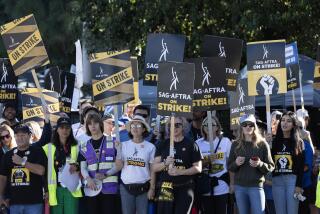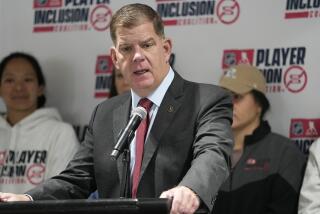It’s Getting Late in NHL Game
- Share via
Still divided by the NHL’s insistence on linking salaries to revenues and the players’ association’s rejection of such restraints, the key figures in hockey’s labor dispute kept a low profile Friday while the clock advanced toward wiping out the season.
Tim Leiweke, president of the Kings and a member of the NHL’s executive committee, believes that moment has already arrived.
“I’m resigned to the fact that at this point you can assume we won’t see hockey this year, and resigned to the fact we may not see hockey next year, unfortunate as that may be,” he said Friday. “From our standpoint, it is unfortunate what we’re doing to our fans, who have been very loyal, but we have no choice. ...
“I’ve seen stories that indicate Gary [Bettman, the NHL commissioner] is under a lot of pressure. But that’s absolutely not true, and in every conversation I’ve had with Gary it’s clear he understands that if we’re going to make our fans go through this, we’d better fix it for good. I’m unaware of any owner blinking, and I talk with a lot of owners for various reasons. A Band-Aid puts us right back where we were before.”
A league source said that owners, who had previously proposed pegging salaries to 54% of revenues, were willing to raise that to 58%, but players saw it as a salary cap and unacceptable.
Another source familiar with Thursday’s talks in New York said the NHL’s main concept was a $42-million hard cap with no luxury tax. He said the NHLPA rebuffed that and proposed a system that would include a luxury tax, revenue sharing and soft-cap thresholds. Clubs would pay a tax of $1 or $1.50 for every dollar over set levels or lose or transfer draft picks. The NHL has said a luxury tax won’t deter big spenders from recreating the inflationary pressures that led to leaguewide losses of $497 million the past two seasons.
That source also said owners were willing to play as few as 20 games this season, which would require a deal within 10 days. They’d benefit from that scenario because salaries would be prorated based on the number of games played and because players aren’t paid during the playoffs. Owners could collect playoff money, renew marketing efforts and see the Stanley Cup awarded, avoiding the stigma of becoming the first North American professional sports league to cancel an entire season.
Lou Lamoriello, general manager of the New Jersey Devils and a participant in the last two negotiating sessions, remained hopeful the season would be played. “The commissioner has not said anything to the contrary, so he feels comfortable something can be done,” he said by phone. “But the 11th hour is pretty much ticking. The hands of the clock are getting closer.”
Lamoriello declined to comment on the talks but said he’d return to the bargaining table “if needed.”
Bill Daly, an NHL executive vice president and its chief legal officer, said via e-mail he’d had no contact with his union counterpart, Ted Saskin, since Thursday’s meeting broke up. Nothing is scheduled, Daly said, adding, “I hope to hear from Ted in the next couple of days. I can’t comment on the status of the process beyond that, because I committed I wouldn’t.”
The NHLPA did not respond to e-mail and phone messages.
Elsewhere, optimism seemed to dwindle. Mighty Duck goaltender Jean-Sebastien Giguere, one of the team’s union representatives, signed a contract to play in Hamburg, Germany, and planned to fly there Monday.
He said he and his agent, Bob Sauve, “pretty much viewed this as the last chance to get a deal done. It’s getting pretty late and how much longer can we go and have a season that is meaningful? I see this as being over.”
Also, the Minnesota Wild, one of the NHL’s most profitable operations, said it would lay off 6% of its employees if there was no labor deal by mid-February. The club laid off 5% of its staff in September.
More to Read
Go beyond the scoreboard
Get the latest on L.A.'s teams in the daily Sports Report newsletter.
You may occasionally receive promotional content from the Los Angeles Times.








